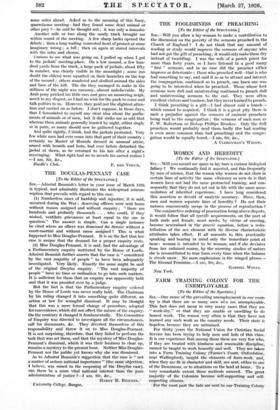THE DOUGLAS-PENNANT CASE
[To the Editor of the SPECTATOR.] SIR,—Admiral Beamish's letter in your issue of March 13th is typical, and admirably illustrates the widespread miscon- ception that prevails with regard to this case.
• (1) Numberless cases of hardship and injustice, it is said, occurred during the War ; deserving officers were sent home without reason assigned and without enquiry ; " there are hundreds and probably thousands . . . who could, if they wished, ventilate grievances at least equal to the one in question." The answer is simple. Can a single instance be cited where an officer was dismissed the Service without a court-martial and without cause assigned ? This is what happened to Miss Douglas-Pennant. It is on the fact that her case is unique that the demand for a proper enquiry rests.
(2) Miss Douglas-Pennant, it is said, had the advantage of a Parliamentary enquiry instituted by the House of Lords. Admiral Beamish further asserts that the case is " considered by the vast majority of people " to have been adequately investigated. Very likely. Exactly the same might be said of the original Dreyfus enquiry. " The vast majority of people " have no time or inclination to go into such matters. It is sufficient for them that an enquiry was apparently held and that it was presided over by a judge.
But the faCt is that the Parliamentary enquiry ordered by the House of Lords was never really held. The Chairman by his ruling changed it into something quite different, an action at law for wrongful dismissal. It may be thought that this was a mere formal change of procedUre, adopted for convenience, which did not affect the nature of the enquiry. On the contrary it changed it fundamentally. The Committee of Enquiry was directed to investigate all the circumstances, call for documents, &c. They divested themselves of this responsibility and threw it on to Miss Douglas-Pennant. It is not surprising, therefore, that they failed to perform the task that was set them, and that the mystery of Miss Douglas- Pennant's dismissal, which it was their business to clear up, remains a mystery to the present hour. Neither Miss Douglas- Pennant nor the public yet knows why she was dismissed.
As to Admiral Beamish's suggestion that the case is " not a matter of serious national importance " (the same objection, I believe, was raised to the reopening of the Dreyfus ease), an there be a more vital national interest than the pure administration of justice ?—I am, Sir, &c.,
• University College, Bangor. HARRY R. RsicrrEE.






















































 Previous page
Previous page